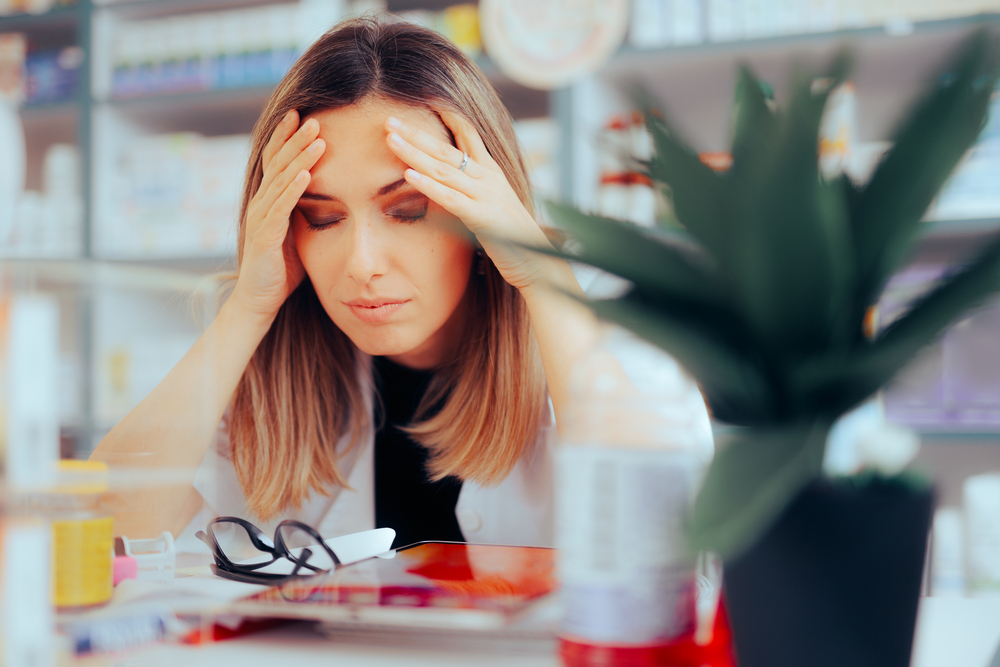What is pharmacist burnout?
Burnout is a state of physical and emotional exhaustion that arises from prolonged stress, and pharmacists are vulnerable to it due to the high demands of their job. Common effects of pharmacy burnout include a decrease in job satisfaction, reduced productivity, and an increased risk of errors and patient safety incidents.
According to a recent nationwide pilot survey conducted by the American Society of Health-System Pharmacists (ASHP), approximately 60% of pharmacists reported feeling burnout. This is a significant increase from previous surveys and highlights the urgent need for interventions to address and prevent pharmacy burnout.
The purpose of this blog is to provide you with actionable tips on how to avoid burnout.
Understanding the Causes of Burnout in Pharmacy
It is an important step for pharmacists to understand the causes of burnout so as to address it effectively. Burnout is a condition that can affect individuals who experience chronic workplace stress. While burnout can have various causes, certain factors are more likely to contribute to it. The most common causes of burnout for pharmacists include:
- Heavy workload and job demands
- Lack of control or autonomy over one's work
- Insufficient support from colleagues or supervisors
- Unclear job expectations
- Poor work-life balance
- Inadequate compensation
- negative work culture
- Emotional demands of work
Symptoms of Burnout in Pharmacists
Pharmacy burnout is a growing concern in the healthcare industry and, if left unaddressed, can have a significant impact on a pharmacist's well-being and their ability to provide quality patient care. The signs and symptoms of pharmacist burnout may include:
- Emotional exhaustion: feeling drained and overwhelmed; loss of motivation; and a sense of hopelessness or helplessness
- Depersonalization: a negative, cynical, or detached attitude towards patients, colleagues, or the job in general.
- Reduced personal accomplishment: feeling less competent and less effective at work; difficulty concentrating; and reduced productivity
- Physical symptoms include headaches, muscle tension, back pain, gastrointestinal problems, and insomnia.
- Changes in behavior, such as increased use of drugs or alcohol, social withdrawal, and decreased interest in activities outside of work
- Anxiety or depression: persistent feelings of worry, fear, or sadness that interfere with daily activities
- decreased job satisfaction: feeling dissatisfied with the work environment, job tasks, and relationships with colleagues and patients
Prevention of Pharmacy Burnout
Preventing burnout in pharmacy can be challenging, but there are steps pharmacists can take to reduce their risk of burnout. Here are some suggestions on how to prevent burnout in pharmacy:
- Prioritize self-care: take breaks, eat a healthy diet, exercise, get enough sleep, and engage in activities that you enjoy. This can help you manage stress and maintain your physical and mental health.
- Set boundaries: Establish realistic work hours and limits on the number of patients you see daily. This can help prevent you from feeling overwhelmed and overworked.
- Seek and receive support: Connect with family, friends, or colleagues who can offer support and encouragement. Consider joining a professional organization or attending continuing education events to stay engaged and connected with other pharmacists.
- Practice stress-management techniques: mindfulness meditation, deep breathing exercises, and progressive muscle relaxation can help reduce stress and promote relaxation.
- Identify and address work-related stressors: Evaluate your work environment and identify stressors that contribute to burnout. Consider seeking feedback from colleagues, supervisors, or patients on areas that need improvement. Discuss potential solutions with your supervisor or employer to address these stressors.
- Continuously learn and grow. Seek opportunities for professional development, such as attending conferences or pursuing additional certifications. This can help keep you engaged and motivated in your work.
- Take vacations or time off: Take time for regular vacations or breaks from work to recharge and refresh. This can help prevent burnout and improve overall job satisfaction.
Final Thoughts
Pharmacist burnout is a serious issue that can lead to negative outcomes for both pharmacists and patients. It is caused by various factors, including a heavy workload, insufficient support, poor work-life balance, and a negative work culture. Understanding the causes and symptoms of burnout is essential to addressing and preventing it.
To avoid burnout, pharmacists should prioritize self-care, set boundaries, seek and receive support, practice stress-management techniques, identify and address work-related stressors, continuously learn and grow, and take regular vacations or breaks from work. These strategies can help pharmacists maintain their physical and mental health, improve job satisfaction, and provide better patient care and well-being.
Consider joining Verovian Healthcare Recruitment Agency if you're seeking a change, as we offer substantial advantages to pharmacists looking to avoid burnout and discover satisfying professional paths.





